THURSDAY, JULY 11
HIGHLIGHTS FROM THE KEYNOTE ADDRESS
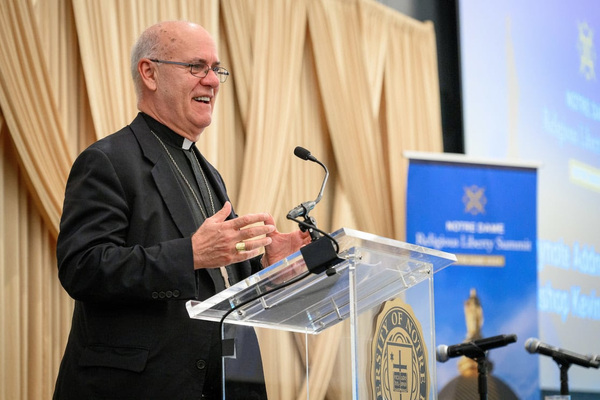
Bishop Kevin C. Rhoades
Bishop Kevin C. Rhoades, the 9th bishop of the Catholic Diocese of Fort Wayne-South Bend, delivered a keynote address to start the last day of the 2024 Notre Dame Religious Liberty Summit.
"Religious liberty itself should not be polarizing. Indeed, Americans seem to be in agreement that religious freedom is important. According to both the Becket Fund's Religious Freedom Index and a recent Pew report, a majority of Americans think religion is good for public life. The idea that people should be free to practice their religion seems to be thoroughly ingrained in the American imagination."
Bishop Kevin C. Rhoades of the Catholic Diocese of Fort Wayne-South Bend
PANEL DISCUSSION
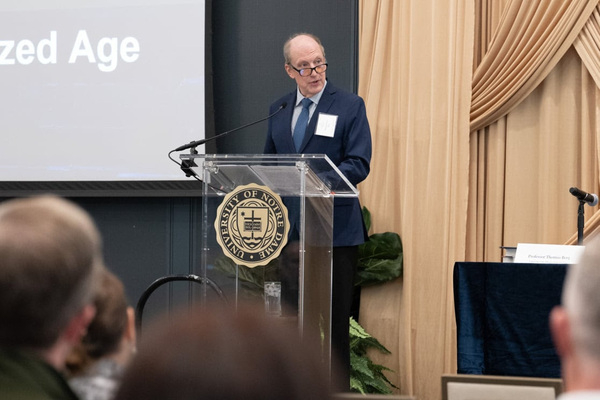
Religious Liberty in a Polarized Age
"Protection of religious liberty can reduce suffering and mitigate polarization — if the protection has three features: First, it must be strong — allowing people ample room not just to believe, but to live out their beliefs without fear of penalty. Second, it must extend to all religious views; it can’t support only the groups with which you sympathize, whether that’s conservative Christians or classic religious minorities (with whom progressives sympathize). Third, religious liberty must have boundaries that take account of other important interests. With careful analysis, I argue, we can have strong religious freedom with proper boundaries."
Professor Thomas Berg, University of St. Thomas School of Law
"I've been looking at the intersection of legal theory and social science to determine ways that we can actually and specifically — not just we, but also the court — can write about things, and speak about things in a way that helps to lower the political temperature. I look to social science because I think, often, we have a lot of theories about what works, but social science tells us what actually works. It tells us how humans think, what motivates human behavior, and what changes the way people think about things."
Professor Asma Uddin, The Catholic University of America
"Religious liberty in a polarized age requires a realistic assessment of which facets of religious freedom matter most and thus cannot be compromised, and which are properly subject to prudential compromises. A stable peace is essential to religious freedom, and peace in a democratic society requires both vigorous protection of essential religious rights and respectful accommodation of the interests and aspirations of others."
Elder Alexander Dushku, The Church of Jesus Christ of Latter-day Saints
"Despite polarization, it is possible to write laws protecting religious liberty — and have them enacted unanimously — when they stand on three pillars for building consensus: they must seek to take people out of positions of conflict; they must assure the public that they are not taking back rights; and they must protect people in equal measure, whatever their political views. Nuanced legislation that protects freedom of religion is possible when we do not roll back hard won civil rights and we avoid prioritizing one group or view over another."
Professor Robin Wilson, University of Illinois College of Law
PANEL DISCUSSION
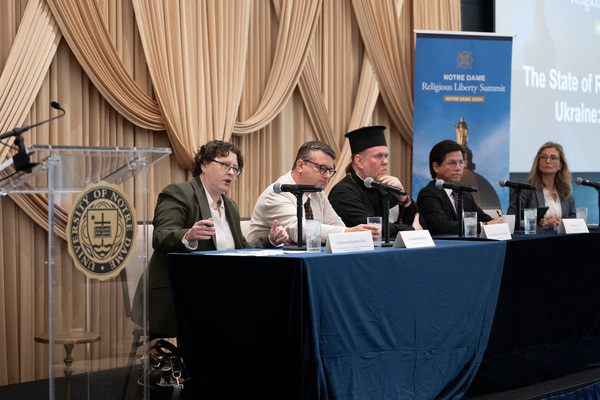
The State of Religious Freedom in Ukraine: Then and Now
"Religious freedom promotes the common good, even when it's difficult, even when it's for people you deeply disagree with, who you think are insidious and morally harmful."
Professor Elizabeth Clark, Brigham Young University
"The war which started in 2014 casts a long shadow. In the occupied Crimea and parts of the Donetsk and Luhansk regions, the number of religious organizations during this time halved, only the number of communities of the Moscow-linked Orthodox Church remained unchanged. This brutal suppression isn't just persecution; it's a deliberate attempt to redraw Ukraine's religious map, erasing the rich tapestry woven through decades of religious freedom."
Dr. Anatolii Babynski, Ukrainian Catholic University
"Ukraine is a country with a high level of religious freedom and maintains internal religious peace. The existence of an independent, sovereign, democratic Ukraine is a guarantee of observance of the right to freedom of religion. Within free territories, freedom of religion is a reality protected by law. Freedom of religion does not exist in the territories occupied by Russia."
Metropolitan Yevstratiy Zoria, Orthodox Church of Ukraine
"Ukraine's commitment to religious freedom is enshrined in its legal framework, but the current conflict casts a shadow. We must ensure all faiths can practice freely for a truly inclusive society. Together, we can support Ukraine in navigating this complex terrain and ensuring a future where religious freedom flourishes for all."
Mr. Nury Turkel, Hudson Institute
"For the United States of America, advancing and protecting religious liberty around the world is now a national security imperative. Nations can prosper only when they have pluralistic societies where the freedom of conscience of its citizens is protected, and its citizens are allowed to be free and equal."
Mrs. Samah Norquist, U.S. Agency for International Development (USAID)
PANEL DISCUSSION
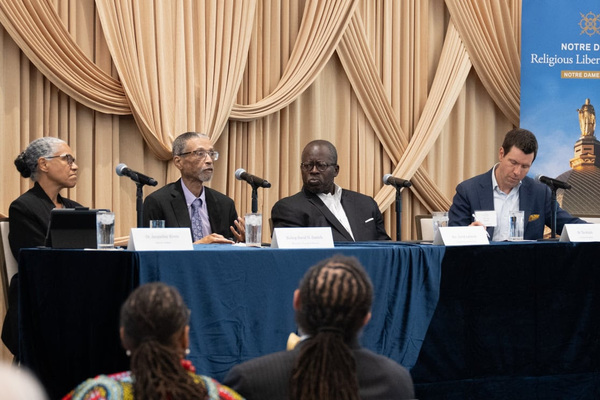
The Black Church and Religious Freedom
Brooke Girley, assistant professor of law at Delaware Law School, moderated the panel discussion.
"What does the Civil Rights Movement’s philosophy of non-violence teach us about depolarizing today’s battles over religious liberty?"
Bishop David Daniels, McCormick Theological Seminary
"The Civil Rights Movement and the movement to abolish slavery were among the most consequential exercises of religious freedom. This makes the Black church a natural ally in the struggle to defend biblical views on family, abortion, sexual orientation, and gender identity. Moreover, Black people, as targets of racial hostility in the U.S., are uniquely positioned to rebut the claim that religious freedom is discrimination. However, Blacks have been slow to identify with religious freedom, weakening the struggle for religious rights in America."
Dr. Jacqueline Rivers, Harvard University, Seymour Institute for Black Church and Policy Studies
"You can’t understand religious freedom in America without understanding the Black church’s profound contributions."
Mr. Tim Schultz, 1st Amendment Partnership (1AP)
"There are tremendous numbers of African American religious communities that signed off wholeheartedly on the concepts that represent religious liberty. There is a shared commitment to the experience of religious liberty, so why don’t we see more of the church actively engaged in these issues?"
Rev. Dr. David G. Latimore, Betsey Stockton Center for Black Church Studies at Princeton Theological Seminary
CULTURAL EXPERIENCE
Raclin Murphy Museum of Art
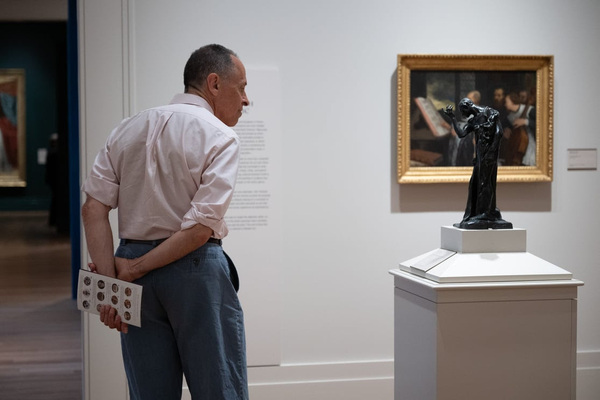
After all of the academic programming, the summit attendees had the opportunity to visit the Raclin Murphy Museum of Art, located on the Notre Dame campus.
Read the other daily recaps from the 2024 Notre Dame Religious Liberty Summit: